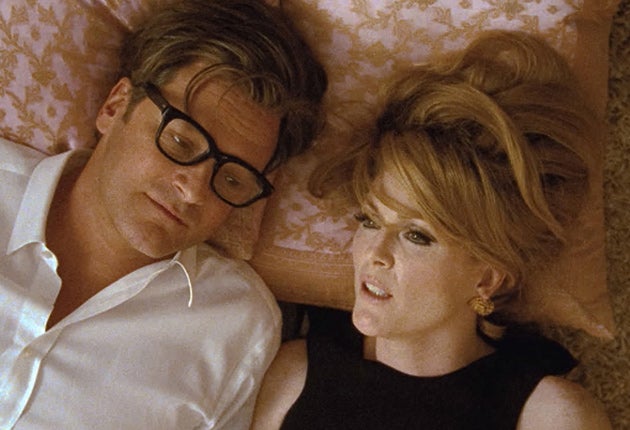A Single Man, Tom Ford, 100 mins (12A)
Tom Ford's cinematic love letter to the Sixties, starring Colin Firth as a bereaved, gay Englishman in LA, hits the spot as a highbrow weepie

You tend to think of Colin Firth as a good sport. So many of his roles have had him gamely playing along as an object of desire or amusement – which may involve him singing or wearing an unflattering jumper – or looking on with terse compassion at someone else's drama.
Firth rarely gets the opportunity to give his all, but the balance is redressed in A Single Man, which has bagged him a deserved Oscar nomination for Best Actor.
Firth plays English expat George Falconer, a literature professor in 1962 Los Angeles, who lives alone since his partner Jim (Matthew Goode) died in a car crash. He lives in the shade of grief, but under the Californian sun, he largely hides his feelings behind his horn-rims. He's an undercover agent in early 1960s America – where times may be a-changing, but not yet mainstream attitudes to sexual difference.
Based on Christopher Isherwood's novel, A Single Man is written and directed by Tom Ford, the fashion designer, whose best-known connection with cinema till now was lolling with Scarlett and Keira on the front cover of Vanity Fair. So is A Single Man a designer's film? It is and it isn't. It is, insofar as Ford has an acute eye for costume, for accessories, for staging a whole period look. But Ford uses fashion because it's expressive. Part of Firth's performance is the crisp grace with which he wears his black suit – armour that protects George from the world and expresses his stylish detachment. A fastidiously sober dandy, George lays his suit out ceremonially when contemplating suicide, leaving a note stipulating that his tie should be in a Windsor knot.
The narrative is episodic. George mooches around in his modernist glasshouse home, wryly observing the Norman Rockwell-ish folks next door. On campus, he interrupts his Aldous Huxley class to give an impromptu lecture on America's fear of the Other (blacks, Russia, Cuba and the invisible Other that George himself represents). His white-bread students don't get it, but he connects with one boy: blue-eyed, sun-kissed hipster Kenny (Nicholas Hoult), who reappears in his life later that day, a temptation and a guardian angel.
The film is extremely evocative of what it might have meant to be gay – and English and intellectual – in Sixties California. Ford is committed to getting inside his hero's perceptions, as George's grief and isolation paint conformist America in dull beige and brown. But through stirring desires and an enduring residue of joie de vivre, George's vision is now and then suffused with erotic flushes of colour. Kenny's rosebud lips turn even rosier, and when George meets a Spanish hunk, the whole sky turns an intense pink – as though Russia had just fired the rockets that everyone (except George) is worrying about.
This sequence, pure stilted fantasy, nearly scuppers the film. It's not just that the Spanish boy (Jon Kortajarena) is so obviously not of the period but of a present-day retro jeans ad. It's also that the scene opens, incongruously, in front of a wall-size image of Janet Leigh's eyes in Psycho – as if Ford were determined to capture an expressionist flavour of Almodóvar at all costs.
By the same token, Ford lets imagination run away with him when it comes to Kenny. Nicholas Hoult's performance is engagingly chipper, but the character is so eager-beaver in his sexiness – solicitous, creamily flirtatious and calls George "Sir" – that you don't believe he's human, but suspect he's about to reveal his wings with a shy wink. Ford dresses Kenny in a white mohair jumper that's like a woven cloud of fluffy soft-focus. I can't quite believe anyone wore such a garment before 1966 – and then only within the walls of Andy Warhol's Factory – but no doubt Ford's knitwear research department can prove otherwise.
The film's strongest section is George's boozily intimate night with fellow expat Charley (Julianne Moore), his best friend and female old flame – the person closest to him but who still fundamentally, and devastatingly, doesn't get him. It's a magnificent scene, a superbly-modulated duet that's by turns exuberant, sorrowful, tender and finally tinged with bleakness. A flamboyantly louche Englishwoman who plays Serge Gainsbourg records and swans around at home in evening gowns and stacked birds'-nest coiffure, Moore's Charley is up for a lark, desolately so. Never was a screen lush so luscious, with her petulant purr and shouty expelled-from-Roedean accent: "I'll have a gin and tonic please, and watch out baby!"
Uneven as the film is, Firth's buttoned-up grace brings it steely authority, his dry tones sustaining a voice-over that's otherwise unfeasibly verbose. Firth plays George as a man whose intelligence and humour enable him to play the outsider role that straight America demands of him, and make it his own. And if you've never seen Firth play a despairing outburst, he shows he can, very commandingly.
Once you look beyond the Martini-dry chic, the film – atmospherically shot by Eduard Grau – is old-fashioned from the opening waltz on, a stately, restrained weepie with highbrow appeal. A Single Man is patchy, sometimes overdone, sometimes losing its focus, but certain scenes – Firth alone at home, that peppery duet with Moore – have an adult magnificence that seriously impress.
Next Week:
Jonathan Romney encounters The Headless Woman, a puzzler from Argentinian director Lucrecia Martel
Join our commenting forum
Join thought-provoking conversations, follow other Independent readers and see their replies
Comments
Bookmark popover
Removed from bookmarks